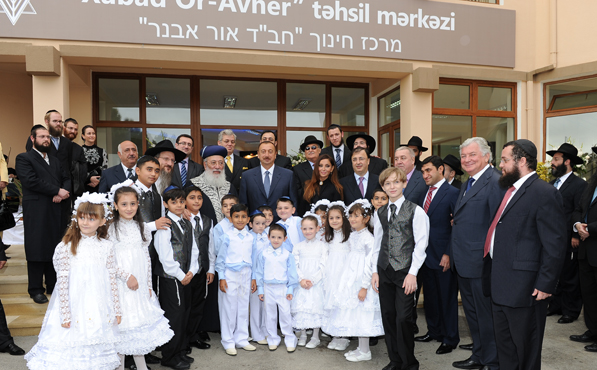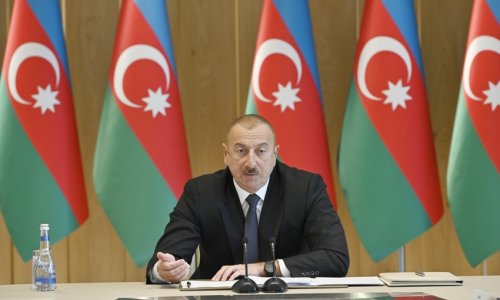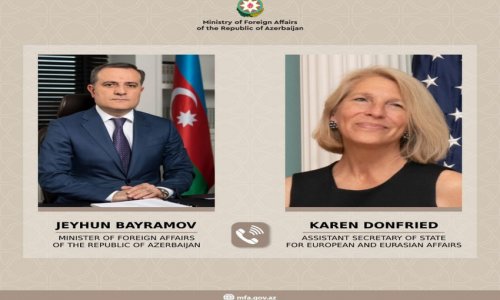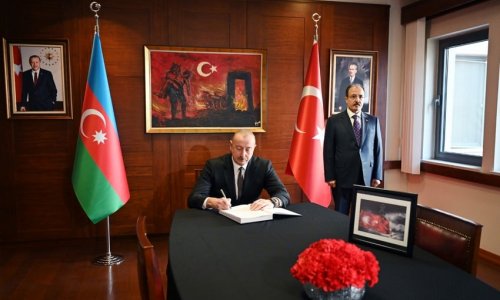By Maayan Jaffe
Over the last several years, the Republic of Azerbaijan, widely acknowledged and praised for its commitment and pursuit of religious tolerance, has become a target of harsh criticism by the United States Commission on International Religious Freedom (USCIF). Apparently, somewhat confused about its mandate, the commission issues statements about political issues, which have nothing to with religion and religious freedom, refers to places within Azerbaijan by Armenian names revealing, inadvertently perhaps, its sources of information. Also, in its criticism of the country it follows the lines used frequently by the Iranian mullahs. Sadly, this reflects both the apparent personal bias and the lack of expertise and first-hand knowledge by the commission’s staff.
As a result, the commission’s statements echo what it hears from the Armenian side and a handful NGO’s in Azerbaijan with some of the same sources used by the Iranian state propaganda to criticize Azerbaijan for being too secular. In fact, putting Azerbaijan in Tier 2 lacks discernment and foresight. Tier 2 puts Azerbaijan in the company of known totalitarian and unstable regimes like those the Communist and atheist Cuba (despite new efforts) and Afghanistan, which is officially an Islamic Emirate.
The ranking comes largely because of new "restrictive amendments” the Azerbaijani parliament adopted in 2013 to prevent the spread of extremism and of foreign missionary activity. The commission says these amendments limit religious freedoms and are being used to justify some of the fines, police raids and other action Azeri police and officials have had to exercise against extremist religious groups.
Here is an example of what the report cited as the government’s control of religion:
• Muslim headscarves are banned from schools. Actually, this is not a ban but a uniform applies universally to all public schools, a policy similar to that in France.
• State permission is required to produce, import, export or distribute religious materials.
• Azerbaijan has closed numerous houses of worship — mostly mosques — it suspects are espousing or taking part in extremist messaging or activities.
What the commission does not seem to recognize is that these restrictions are essential for ensuring democracy — as well as the safety and security of the Azeri people. Azerbaijan, located in the Caucasus region, is surrounded by rogue states that are fundamental threats to world freedoms and stability: Russia, with its unstable and explosive North Caucasus to the north, Iran to the south, and Armenia to the southwest and west. It is one of the only remaining Muslim-majority countries that has not been overtaken by extremist ideologies, as Syria, Lebanon, Tunisia, Libya, and many others have.
In Azerbaijan, women are still empowered and minorities, such as the Jews, enjoy safe and free lives. This is not despite the restricting radicalism, but because of the government’s efforts.
Part of USCIF’s report is a series of recommendations, including that the U.S. government should prioritize religious freedom and related human rights in Azerbaijan.
Azerbaijan is far from perfect and must do much more to become a full-fledged democracy. However, if Azerbaijan deserves some of the human rights criticism directed at the country— and there is plenty of critics doing that on daily basis — condemning Azerbaijan on religious grounds is truly misplaced and, as history shows, is counterproductive.
Furthermore, USCIF recommendations encourage public scrutiny of Azerbaijan’s religious freedom record in international fora, and encourage the Broadcasting Board of Governors to increase radio, Internet and other broadcasting — particularly in the Azeri language — on Azerbaijan’s human rights and religious freedom record, and freedom of religion or belief as an element of U.S. foreign policy.
Before this administration scrutinizes or reproaches another country, it should take a long hard look at itself.
In 2007, when America called for democratic elections to be held in the Gaza Strip, Hamas took over the region. Now, the Gaza Strip is a crime-laden, terrorist enclave. In 2012, the United States supported the opposition in Egypt and encouraged the overthrow of the reliable Hosni Mubarak. The country was taken over by the Muslim Brotherhood, instantly quelling the breathless celebrations of Egyptian democracy and is now run by a regime much more restrictive than Mr. Mubarak’s. In Iraq, America removed Sadam Hussein, leaving the country void of a leader. Imminently upon the withdrawal of American troops, the murderous Islamic State took hold of much of the country. And, in Lybia, the United States supported the overthrow of the largely contained dictator Moammar Gadhafi, just to see the country to plunge into instability, violence and become a major to regional security, all while watching the American ambassador die in an attack on the U.S. mission in Benghazi.
U.S. press freedom has profoundly eroded. In 2013, a year highlighted by attacks on whistleblowers and digital journalists and revelations about mass surveillance, Reporters without Borders dropped the U.S. freedom of press rating 13 spots, to No. 46.
Hate crimes in the United States are also on the rise, including the recent religiously motivated stabbing of a Florida rabbi and the spring 2014 shooting by a white supremacist at the Jewish Community Center in Overland Park, Kan., which resulted in the death of three people.
Azerbaijan could certainly explore opportunities for growth and new routes to allow for increased freedom of religion, but the United States must allow the country to manage extremist tendencies the best way it can. And, of course, neither America’s venerable institutions, not its sincere commitment to human rights and religious freedom should be used to justify what is clearly a bias against a U.S. regional ally. And if Tier 2 is obviously too low for Azerbaijan, given the world’s problems today, nothing in Azerbaijan explains why it is a top target of the U.S. Commission on International Religious Freedom’s criticism.
• Maayan Jaffe is a former editor-in-chief of the Baltimore Jewish Times and a regularly contributing writer to JNS.org.
www.ann.az
Follow us !











